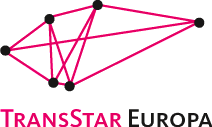PRAGUE, June 2015
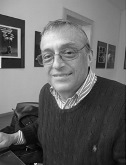 Jindřich Mann
Jindřich Mann
Jindřich Mann is filmmaker and author who lives in Prague and Berlin and received positive attention in the literary public sphere for his novel Prag, roste restante. Mann was born in 1948 in Prague as the grandson of Heinrich Mann. His mother Leoni was the only daughter of Heinrich and Maria „Mimi“ Mann; Jindrich’s father was Ludvik Aškenazy, a successful writer in Czechoslovakia. In 1968, after the violent suppression of the Prague Spring, Jindrich Mann with his parents and younger brother Ludvik emigrated to Western Europe and only after the European changes in 1989 was he able to return to his home city.
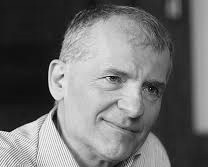 Jan Faktor
Jan Faktor
Jan Faktor was born in Prague in 1951. In the 1970s he was working as a sherpa porter in the High Tatras and again in Prague as a data processing specialist. In 1978 he moved to join his wife in East Berlin where he started writing literary texts, at first primarily of experimental nature. Since 1991 he dedicates his work exclusively to literature, publishing four anthologies of poetry and also prose starting in the middle of the 1990s. His first novel was never published whereby in 2005 the manuscript of his second novel Schornstein [Smokestack] was awarded the Alfred Döblin Prize. His novel George’s Worries About the Past was released in 2010 in German and was well-received both by the readership and by literary critics. He was nominated for the Prize of the Leipzig Book Fair and was short-listed for the German Booker Prize. In the same year Jan Faktor was honoured for his hitherto lifework with the Candide Prize.
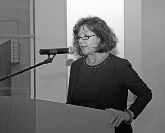 Zsuzsanna Gahse
Zsuzsanna Gahse
Zsuzsanna Gahse was born in Budapest in 1946; Hungarian is her native language. After the suppression of the Revolution in Hungary in 1956 she fled to Vienna with her family. Many years she lived in Stuttgart, today she resides in Müllheim. Starting in 1969 she began publishing her first literary texts, since the end of the 1070s she translates from Hungarian. In 2010 she was awarded the Johannes Heinrich Voß Prize for Translation, one year later she was admitted into the German Academy for Language and Poetry.
A Prague based Czechoslovakian fusion septet (guitar, saxophone/flute, bass, drumset, string section) medial attention, and a positive echo and critique from the music audience. Hermann Hesse being translated in a different medial form: jazzrock music compositions and collages of texts present a unique interpretation of the eternal battle between reason and passion.
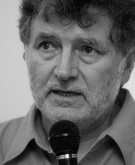 Radovan Charvát
Radovan Charvát
After his studies at Technical University in Prague (1972) where he was active as a mathematician at the data processing center in Prague (until 1984), he became a freelance translator and journalist. In 1987 he spent one year in Africa. From 1989 to 1990 he studied German, English and American Studies at the J.W. Goethe University in Frankfurt (literary theory, German literature of the 19th century, slang in American English). Since 1989 he is a freelance translator from German and English into Czech. He is divorced and has one child named Jan (*1985).
He translates screenplays into German, conducts simultaneous translations of films on TV and movies, and newspaper articles (Literární noviny, Lidové noviny).
Cooperation with: Austrian Cultural Forum Prague, ARD Studio Prague, Goethe Institute Prague (readings), Suhrkamp Publishers Frankfurt, Hanser Publications Munich, Aufbau Publishers Berlin and Volvox Globator, Prostor, Paseka, Opus and Argo (all in Prag).
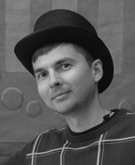 Miloslav Man
Miloslav Man
Miloslav Man was born in Pisek in 1979. He studied German and History at the Pedagogical Faculty of the South-Bohemian University in Budweis. Since 2006 he works as a research assistant at the University of Passau in the project “Building Blocks of History: Bavaria-Bohemia” and works to mediate information to the students from this border region on the history and culture of each others neighboring country. In addition he is the coordinator of the Czech and German language animators for language tandems and occasionally a city guide and pedagogical staff member of Prague Contact. In 2012 he considerably contributed to the development of the permanent exhibit on German-language literature in Prague in the Prague Literary House of German-Language Authors. He loves India, Prague, Psytrance, water, interesting books and many other things.
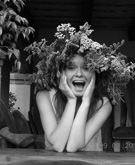 Olga-Daryna Drachuk
Olga-Daryna Drachuk
Olga-Daryna Drachuk was born 1989 in Vinnyzia, Ukraine. Studied Pedagogy and German studies at National Ivan-Franko-University of Lviv. Since 2013 she is fellow of DAAD-Foundation. She studies social work at Cologne University of Applied Sciences. The main focuses of her study are international youth work, cultural youth education and theatre pedagogy. Her interests are aesthetic space exploration, photography, vocal, action art, performance and installation. She is an independent translator and performer.
Karolina Matuszewska
Karolina Matuszewska (born 1988) is doctoral candidate at the chair of Austrian and Swiss Literature and Culture (University of Szczecin) and a student in Roman Philology. Her main area of interest is German literature, primarily the works of Paul Scheerbart and Urs Widmer. She has participated in German-Polish oral history projects and in translation competitions.
Anna Koubová was born 1990 in Prague and studied Czech Language and Literature, Translation and Linguistics in Prague, Paris and Berlin. For several years already she has worked as an interpreter and German and Czech teacher, now living in Munich. Currently her first steps in the translation adventure are being made. She has been involved as a volunteer in German-Czech Youth Forum and Literature Magazine “Plav” and is keen on communication between people and cultures, on languages, literature and nature of any sort.
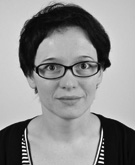 Michaela Otterová
Michaela Otterová
Michaela Otterová (born 1977 in Vsetín, Czech Republic) graduated in French and German Philology at the Faculty of Arts of Charles University in Prague. She studied at Leipzig University for two terms and in Freiburg im Breisgau (as a scholarship student of German Academic Exchange Service DAAD) for free months. Currently, she teaches both languages at a Prague grammar school. She writes critical reviews for literary periodicals. In 2011, she made a radio series about R. M. Rilke for ČRo Vltava. She translates philosophical, historical and literary history texts, for instance the monograph accompanying the exhibition Praha—Prag 1900-1945 / Literaturstadt zweier Sprachen, vieler Mittler [Praha – Prague / Literary City of Two Languages, of Many Mediators]. In 2012, she was awarded an honourable mention in Jiří Levý Translation Competition for her translation of individual poems by Rilke.
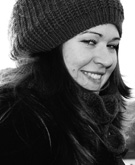 Petra Grycová
Petra Grycová
Petra Grycová was born 1987 in Prague and studied there German and Ukrainian studies on the Charles University. Once upon a time she started also Polish studies as well as Linguistics-Phonetics. Although both remained just a start the most important element stayed: The love to the Polish language and to Linguistics. Petra likes to read interesting books, naturally, as well as to learn languages and discover cultures. And she does love theatre – to play as well as to see – and her free time is going to be more and more occupied by different theatre activities. She lives in Münster where she also makes her PhD. in German Sociolinguistics (National Varieties of German language) and attends theatre pedagogical course.
After the BA in German and English Business Language she graduated in German Studies at Palacký University in Olomouc. Since 2010 she is a student in the PhD program on German Literature. Her research focuses on Moravian literature around 1900; she participates in the research of the Centre for German Moravian Literature in Olomouc. Since 2012 she is a fellow of the Vladimir-Admoni Program of the DAAD. She heads the Austria Library in Olomouc.
Katka Ringesová is a young translator and Czech teacher who spends her working hours helping people find love. Born in Planá in 1980, she studied in Pilsen and Regensburg and now lives in Berlin. For her, translating is a chance to discover literature on a different level than by simply reading it – a way to find her own voice. First steps on this journey have already been made, more will follow…
Born in Dachau (Bavaria) in 1982. She completed her studies of Political Science and Bohemian Studies at the universities of Regensburg and Brno (CZ). At the information office of the “Brücke/Most”-Foundation in Prague and the Consulate of the Czech Republik in Duesseldorf she was able to practice her skills. Since January 2012 she has been working as a project manager in the Czech Center in Duesseldorf. Her tasks and duties are to organise events, related to and based on the Czech culture such as movies, films, theater and literature. She also mobilizes the Czech-addicted community all over in the state of Northrhine Westphalia.
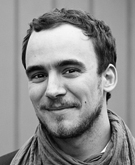 Martin Mutschler
Martin Mutschler
Martin Mutschler, born in Stuttgart in 1986, studied Romance Philology, Slavic Philology and Art History in Tübingen and Prag and is currently working at the theatre. He writes on culture and translates from different languages. In the winter of 2011/12 he was an intern at the European Capital of Culture 2015 in Pilsen, after that he was a committee member of the GFPS-CZ association. Since 2013, he has studied musical theatre direction in Hamburg. Anything else? Everything about culture, within culture, for us. Music is important, maybe the passion for poetry or the world of Bohumil Hrabals’ language derives from music.
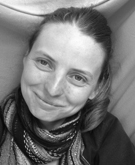 Daniela Pusch
Daniela Pusch
Born 1978 in Czechoslovakia, but grew up in Germany, in Leverkusen. She studied slavonic studies and film studies in Marburg, Moscow and Brno. Since 2004, she is living in Düsseldorf with her family, where she works as a translator, as city guide and as a language teacher. She also reads stories in foreign languages to children. For the moment, she is working on the texts by Alena Zemančíková (some of them are publicated in LICHTUNGEN and Sudetenland). In 2014, she won the Young Translaters’ competition run by Czech Centres with her translation of Bohumil Hrabal’s short story Perlička na dně (Little pearl at the bottom).
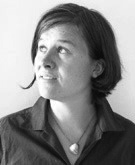 Martina Lisa
Martina Lisa
Born and raised in Czechoslovakia, she studied History and German as a Foreign Language at the University of Leipzig. Because of numerous trips and professional stays (teaching German) in mostly Eurasian countries (Azerbaijan, Russia, Tadzhikistan) and her socialization in Czech and German environments requires moving and switching between cultures and thus belongs to her way of life. After her studies she traslanted texts primarily from the humanities. In her last project she edited and translated (together with Anna Ohlidal) an 17th century chronicle from Old-Czech into German. Her latest literary discoveries are Němci from Jakuba Katalpa, Rybí krev from Jiří Hájíček, Zvuk slunečních hodin from Hana Androníková and the poems from Ondřej Buddeus.
TÜBINGEN, Mai 2015
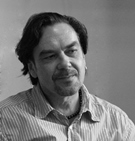 Yuri Andrukhovytsh, is a Ukrainian writer and was born in 1960 in Stanislav (today Ivano-Frankivsk). In 1985 Andrukhovytsh founded the by now legendary literary performance group Bu-Ba-Bu together with his friends Oleksander Irvanets and Victor Neborak. To date he has released five volumes of poetry as well as five novels. In addition, Andrukhovytsh writes literary essays and translates from the German, Polish, Russian and English languages. Together with the Polish writer Andrzej Stasiuk he published the volume „My Europe“in Poland in 2000. In 2005 his novel entitled „Zwölf Ringe“ [Twelve Rings] was published by Surkamp publishing in 2006 – „Moscoviada“ in 2008 – „Geheimnis“ [Secret] and in 2011 – „Perversion“ [Perversion].
Yuri Andrukhovytsh, is a Ukrainian writer and was born in 1960 in Stanislav (today Ivano-Frankivsk). In 1985 Andrukhovytsh founded the by now legendary literary performance group Bu-Ba-Bu together with his friends Oleksander Irvanets and Victor Neborak. To date he has released five volumes of poetry as well as five novels. In addition, Andrukhovytsh writes literary essays and translates from the German, Polish, Russian and English languages. Together with the Polish writer Andrzej Stasiuk he published the volume „My Europe“in Poland in 2000. In 2005 his novel entitled „Zwölf Ringe“ [Twelve Rings] was published by Surkamp publishing in 2006 – „Moscoviada“ in 2008 – „Geheimnis“ [Secret] and in 2011 – „Perversion“ [Perversion].
Herder prize of the Alfred Toepfer Foundation, Hamburg (2001), special Erich-Maria Remarque Peace Prize of the city of Osnabrück (2005), the Book Prize of Leipzig on European Understanding (2006), Hannah Arendt Prize for Political Thought (2014).
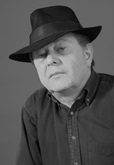 Lubomír Martinek was born in the Bohemian Budweis in 1954 and until 1979 he lived in Prague. He then fled to Paris where he lived in exile as a political refugee. Since 1989 he shares his time between Prague, Paris and Indonesia. Since 1993 he has become a French citizen. He has carried out different practical activities; writing and travelling are a constant in his life. In his works he tries to discover the possibilities and the limits of content and form. Topics he primarily concerns himself with are questions on human existence, identity and communication. His Œvre consists of more than 20 books of which some were translated into English, German, French and Swedish.
Lubomír Martinek was born in the Bohemian Budweis in 1954 and until 1979 he lived in Prague. He then fled to Paris where he lived in exile as a political refugee. Since 1989 he shares his time between Prague, Paris and Indonesia. Since 1993 he has become a French citizen. He has carried out different practical activities; writing and travelling are a constant in his life. In his works he tries to discover the possibilities and the limits of content and form. Topics he primarily concerns himself with are questions on human existence, identity and communication. His Œvre consists of more than 20 books of which some were translated into English, German, French and Swedish.
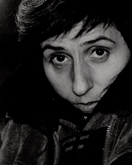 Sudabeh Mohafez has lived in Teheran, Berlin and Lisbon and for some years, meanwhile she has settled in Baden Württemberg. Following her studies in music, English studies and pedagogics she has worked in the prevention of violence and crisis intervention. Her literary work has been awarded a number of literary stipends and prizes as well as a lectureship of poetics at the RheinMain College. After visits at the Queen Mary University of London and the University of Nottingham in 2012, 2013 and 2014 as a writer in residence, she will spend an entire year writing at her house in the Swabian forest where it is possible to write as wonderfully as it would be in any other large (and small) city of this world. Here she will work on her new novel and on a new poetry project while simultaneously two plays will come into existence fort he directors Boglarka Raiser and Wilfried Alt
Sudabeh Mohafez has lived in Teheran, Berlin and Lisbon and for some years, meanwhile she has settled in Baden Württemberg. Following her studies in music, English studies and pedagogics she has worked in the prevention of violence and crisis intervention. Her literary work has been awarded a number of literary stipends and prizes as well as a lectureship of poetics at the RheinMain College. After visits at the Queen Mary University of London and the University of Nottingham in 2012, 2013 and 2014 as a writer in residence, she will spend an entire year writing at her house in the Swabian forest where it is possible to write as wonderfully as it would be in any other large (and small) city of this world. Here she will work on her new novel and on a new poetry project while simultaneously two plays will come into existence fort he directors Boglarka Raiser and Wilfried Alt
Alena Zemančikova was born in 1955 and studied dramatic theory at the Academy of Arts in Prague. She worked as a dramatic advisor in Cheb (Western Bohemia). Since 1997 she works at the cultural radio station of Czech radio. She is very active in German/Czech theatre and works as a correspondent for a number of online journals. Until now she has published three volumes of short stories. Within the framework of the TransStar Europe project she has translated a several texts by Daniela Pusch.
Boris Dežulović was born in 1964 and studied history of art at the University of Split. He worked as an illustrator, comic illustrator and journalist for Nedjeljna Dalmacija and Slobodna Dalmacija journals. He is one of the three founders of the weekly newspaper Feral Tribune for which he worked as an editor and author for a long time. Since 2000 he is a constant columnist for different newspapers. He published novels and political-satirical poems of which the following were translated into German and published in 2008: Gedichte aus Lora [Poems from Lora] at Drava Publishers in Klagenfurt and the short story Die Bakterie [The Bacteria] in the anthology entitled Kein Gott in Susedgrad. Neue Literatur aus Kroatien [No God in Susedgrad: New Croatian Literature] at Schöffling & Co, (ed.) Nenad Popović, Frankfurt am Main.
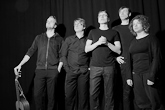 Action und Drama is a young improve theatre in Leipzig. The ensemble moves away from the long-standing tradition of slapstick comedy that is common for this metier and tries to bring more depth to scenes and characters. In this way, a complete play results from the input provided by the audience and the associative play of the actors without each knowing beforehand what it will look like. An evening in the sign of spontaneity that is just as serious as it is funny.
Action und Drama is a young improve theatre in Leipzig. The ensemble moves away from the long-standing tradition of slapstick comedy that is common for this metier and tries to bring more depth to scenes and characters. In this way, a complete play results from the input provided by the audience and the associative play of the actors without each knowing beforehand what it will look like. An evening in the sign of spontaneity that is just as serious as it is funny.
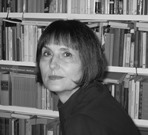 Ilma Rakusa received her degree in Slavic and Romance studies and currently lives as a writer, journalist and translator (from Russian, Serbo-Croatian, Hungarian and French) in Zürich. She was awarded the Petrarca Translator Prize, the Adelbert-von-Chamisso Prize and in 2009 the Swiss Book Prize for her memory passages “Mehr Meer” [a wordplay on „More Ocean“]. She is a member of the German Academy for Language and Poetry. www.ilmarakusa.info
Ilma Rakusa received her degree in Slavic and Romance studies and currently lives as a writer, journalist and translator (from Russian, Serbo-Croatian, Hungarian and French) in Zürich. She was awarded the Petrarca Translator Prize, the Adelbert-von-Chamisso Prize and in 2009 the Swiss Book Prize for her memory passages “Mehr Meer” [a wordplay on „More Ocean“]. She is a member of the German Academy for Language and Poetry. www.ilmarakusa.info
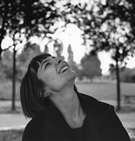 Foto © Timm Kolln
Foto © Timm Kolln
Uljana Wolf is a poet and translator and has published four volumes of poetry, the latest edition is called meine schönste lengevitch [my prettiest lengevitch] (kookbooks 2013). Wolf translates from the English (John Ashbery, Yoko Ono, Matthea Harvey, Cole Swensen, Erín Moure) and also from the Polish languages. In 2015 her selective translation of poems by Eugeniusz Tkaczyszyn-Dycki (Tumor Linguae, Edition Korrespondenzen, with Michael Zgodzay). She has been awarded numerous prizes, amongst others with the Peter Huchel prize and the Wolfgang Weyrauch grant. Wolf teaches seminars on translation and poetry at the Pratt Institute in Brooklyn, at the Humboldt University Berlin and the Institute for Language Arts in Vienna.
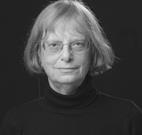 Elke Erb (Foto © gezett.de)
Elke Erb (Foto © gezett.de)
Elke Erb was born in Scherbach in the Eifel from where she then resettled in the German Democratic Republic (Halle). From 1958 /59 she worked on the fields, in 1963 she completed her exams to become a teacher, from 1963/65 she worked at the publishing house and since 1966 she has been working freelance. She conducts translations (primarily from Russian) and takes on editing jobs. Her own texts include short stories and poetry. Her latest publications are Sonanz (2008) at Urs Engeler; Meins [Mine] in Roughbook 006 (2010); Das Hündle kam weiter auf drein [The Puppy Came Further On] in Roughbook 028 (2013) and in Roughbook (2015) Sonnenklar [Crystal Clear].
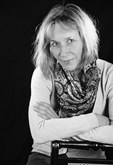 Dagmar Leupold was born in 1955 and studied German studies, philosophy and comparative literature studies in Marburg, Tübingen und New York. She completed her PhD in 1993 an der Graduate School der City University of New York.
Dagmar Leupold was born in 1955 and studied German studies, philosophy and comparative literature studies in Marburg, Tübingen und New York. She completed her PhD in 1993 an der Graduate School der City University of New York.
Since 1985 she is a freelance writer and has to date published a number of literary publications: poetry volumes, short prose and novels such as: „Eden Plaza“ (2002), „Nach den Kriegen“ [After the Wars] (2004), „Die Helligkeit der Nacht. Ein Journal“ [The Holiness of the Night: A Journal] (2009). Her latest is the novel „Unter der Hand“ [On the Quiet] (Jung und Jung).
A selection of awards she has received: Aspect Prize for the best prose debut (1992) and the latest the Tukan Prize of the city of München.
Since 2004 Dagmar Leupold coordinates “Studio Literature and Theatre” at the University of Tübingen.
 Daniela Pusch was born in Karlovy Vary, Czech Republic, in 1978 and grew up in Germany. She studied Slavic and media studies at universities in Marburg, Moscow and Brno. Since 2004 she lives in Düsseldorf with her family. She works as a city tour guide, teaches language and volunteers reading children foreign-language stories. Children, language and literature are three issues important to her, which she often combines with each other. Since she graduated from the university she continues to be busy with translation projects where she is particularly taken by Michal Ajvaz and Ota Hofman.
Daniela Pusch was born in Karlovy Vary, Czech Republic, in 1978 and grew up in Germany. She studied Slavic and media studies at universities in Marburg, Moscow and Brno. Since 2004 she lives in Düsseldorf with her family. She works as a city tour guide, teaches language and volunteers reading children foreign-language stories. Children, language and literature are three issues important to her, which she often combines with each other. Since she graduated from the university she continues to be busy with translation projects where she is particularly taken by Michal Ajvaz and Ota Hofman.
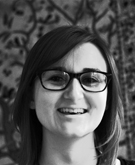 Maja Konstantinović flees to Bruchköbel, Hesse in 1993. After a successful B.A. in slavic studies and political science in Tübingen, she is now in a graduate program for literary and culture theory. In 2008 she participated in “Translators in Residence”, a project of the Slavic department of the University of Tübingen. Her first professional experience in 2009 was writing the subtitles to Tena Štivičić’s play “Seven Days in Zagreb”, which was performed as part of the theatre project “Orient Express” at the Staatstheater Stuttgart. She currently organizes a panel discussion about cross-cultural issues concerning the “verbalization of culture as a process of translation”.
Maja Konstantinović flees to Bruchköbel, Hesse in 1993. After a successful B.A. in slavic studies and political science in Tübingen, she is now in a graduate program for literary and culture theory. In 2008 she participated in “Translators in Residence”, a project of the Slavic department of the University of Tübingen. Her first professional experience in 2009 was writing the subtitles to Tena Štivičić’s play “Seven Days in Zagreb”, which was performed as part of the theatre project “Orient Express” at the Staatstheater Stuttgart. She currently organizes a panel discussion about cross-cultural issues concerning the “verbalization of culture as a process of translation”.
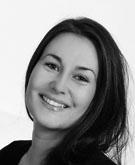 Bojana Bajić graduated from the Faculty of Humanities and Social Sciences at the University of Rijeka with a degree in English and German studies. She conducted longer study trips to Berlin as a fellow of the Copernicus Foundation (Humboldt University at Berlin) and German Academic Exchange Service (DAAD) fellow of the German Partnerships with Higher Education Institutions program between the Institute for German Philology at the Free University of Berlin and the German Studies Department of the Faculty of Philology in Rijeka (Visiting fellow at the Free University of Berlin) . At the Summer College entitled «Literary Translation» organised by the Institute of Translation Studies at the University of Graz she gathered initial experiences in the translation of literary texts. Other experiences include her work with foreign languages (subtitling, editor at a publishing house, foreign language teacher). Currently she works as a freelance translator.
Bojana Bajić graduated from the Faculty of Humanities and Social Sciences at the University of Rijeka with a degree in English and German studies. She conducted longer study trips to Berlin as a fellow of the Copernicus Foundation (Humboldt University at Berlin) and German Academic Exchange Service (DAAD) fellow of the German Partnerships with Higher Education Institutions program between the Institute for German Philology at the Free University of Berlin and the German Studies Department of the Faculty of Philology in Rijeka (Visiting fellow at the Free University of Berlin) . At the Summer College entitled «Literary Translation» organised by the Institute of Translation Studies at the University of Graz she gathered initial experiences in the translation of literary texts. Other experiences include her work with foreign languages (subtitling, editor at a publishing house, foreign language teacher). Currently she works as a freelance translator.
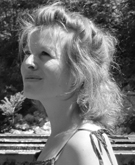
Anna Hodel was born in 1982 and studied Slavic languages and literatures and Eastern European history at the Universities of Basel, St. Petersburg and Zagreb. She teaches Russian at the Language Center of the University of Basel and works as a research assistant at the Slavic Seminar Basel, where she is currently completing her PhD on South Slavic romantic literatures. Furthermore Anna Hodel organizes events between literature and politics.
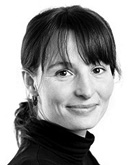 Vivian Alida Kellenberger was born in 1978 studied Slavic languages and literatures and Eastern European studies at the universities of Fribourg, Bern, Moscow (RGGU) and Zagreb. She worked as a interpreter for the delegations of the International Committee of the Red Cross in Bosnia and Herzegovina, Croatia and Serbia as well as for the Croatian Embassy in Bern.
Vivian Alida Kellenberger was born in 1978 studied Slavic languages and literatures and Eastern European studies at the universities of Fribourg, Bern, Moscow (RGGU) and Zagreb. She worked as a interpreter for the delegations of the International Committee of the Red Cross in Bosnia and Herzegovina, Croatia and Serbia as well as for the Croatian Embassy in Bern.
She teaches Croatian in private schools in Zürich and Bern since 2009 and works for the Institute of Slavic Languages and Literatures at the University of Bern since 2011, where she organizes readings with writers from the former Yugoslavia.
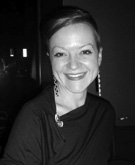
Željka Gorički was born in Zagreb in 1982 and studied English and German language and literature at the Faculty of Humanities and Social Sciences. Works at the Institute of Croatian Language and Linguistics and as a freelance translator. Co-founder of the Nu:Write Theatre Festival.
LJUBLJANA, April 2015
 Raoul Schrott (born 17 January 1964) is an Austrian poet, writer, literary critic, translator and broadcast personality. Schrott was raised in Tunis where his father served as an Austrian sales representative. Raoul attended the universities of Norwich, Paris, Berlin and Innsbruck. He completed a thesis on “Dada 1921 – 1922 in Tirol”. He translated Homer’s wrtitings into colloquial German. In 2008 he was appointed Visiting professor by the Free University Berlin. He lives in Austria. For his work he received many awards:
Raoul Schrott (born 17 January 1964) is an Austrian poet, writer, literary critic, translator and broadcast personality. Schrott was raised in Tunis where his father served as an Austrian sales representative. Raoul attended the universities of Norwich, Paris, Berlin and Innsbruck. He completed a thesis on “Dada 1921 – 1922 in Tirol”. He translated Homer’s wrtitings into colloquial German. In 2008 he was appointed Visiting professor by the Free University Berlin. He lives in Austria. For his work he received many awards:
Award of the Country of Carinthia at the Ingeborg-Bachmann-Competition (1994), Leonce-and-Lena-Prize (1995), Sponsorship award of the Friedrich-Hölderlin-Prize (1996), Berlin Literary Award (1996), Joseph-Breitbach-Prize (2004) and many others.
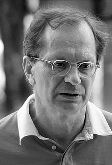 Josef Winkler was born 1953 in Carinthia and grew up on his parents’ farm. He describes his home as a world without language („sprachlose Welt“) and early on felt drawn to language as a mode of self-expression. In 1979 his novel Menschenkind earned him the second place in the renowned Ingeborg-Bachmann-Preis behind Gert Hofmann. Together with his subsequent two novels, Der Ackermann aus Kärnten and Muttersprache, this book makes up the trilogy Das wilde Kärnten. Josef Winkler’s texts are dominated by the themes of death and homosexuality. His renditions of problems individuals encounter in a patriarchal Catholic world have a self-acknowledged autobiographical background. Josef Winkler is member of two associations of Austrian authors, the Grazer Autorenversammlung and the Interessengemeinschaft österreichischer Autorinnen und Autoren. In October 2010 he was nominated member of the Österreichischen Kunstsenat, the Austrian Art Senate, whose president he now is.
Josef Winkler was born 1953 in Carinthia and grew up on his parents’ farm. He describes his home as a world without language („sprachlose Welt“) and early on felt drawn to language as a mode of self-expression. In 1979 his novel Menschenkind earned him the second place in the renowned Ingeborg-Bachmann-Preis behind Gert Hofmann. Together with his subsequent two novels, Der Ackermann aus Kärnten and Muttersprache, this book makes up the trilogy Das wilde Kärnten. Josef Winkler’s texts are dominated by the themes of death and homosexuality. His renditions of problems individuals encounter in a patriarchal Catholic world have a self-acknowledged autobiographical background. Josef Winkler is member of two associations of Austrian authors, the Grazer Autorenversammlung and the Interessengemeinschaft österreichischer Autorinnen und Autoren. In October 2010 he was nominated member of the Österreichischen Kunstsenat, the Austrian Art Senate, whose president he now is.
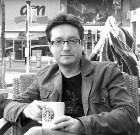 Ostap Slyvynsky, born in Lviv, Ukraine in 1978, he has authored several books of poetry – The Sacrifice of Big Fish (1998), The Midday Line(2004), Ball in the Darkness (2008),The Running Fire in Polish translation by Bohdan Zadura (2009) and in Russian translation by Dmitriy Kuzmin and others (2013), and Adam (2012). In 1997 he was awarded the B. I. Antonych Literary Prize (Ukraine), in 2009 – Hubert Burda Literary Award (Germany), in 2013 – the Prize of Lesia and Petro Kovaliv Fund (USA). Slyvynsky’s poetry and essays were translated into 14languages and included in many Ukrainian as well as foreign anthologies. An active participant and contributor to numerous literary festivals both in Ukraine and abroad, he also coordinated the International Literary Festival at the Publishers’ Forum in Lviv in 2006–2007. He translates from Bulgarian, English, Macedonian, Po lish and Russian (notably Czesław Miłosz, Andrzej Stasiuk, Derek Walcott, Kenneth Koch and many others). In 2007 he was awarded the Polish Embassy’s prize for the best translation of the year for his translation of Traveling to Babadag by Andrzej Stasiuk. He is the associate editor of Polish-German-Ukrainian literary magazine RADAR. In 2007 he earned a PhD in contemporary Bulgarian literature. Slyvynsky is currently occupied teaching Polish literature at Lviv University.
Ostap Slyvynsky, born in Lviv, Ukraine in 1978, he has authored several books of poetry – The Sacrifice of Big Fish (1998), The Midday Line(2004), Ball in the Darkness (2008),The Running Fire in Polish translation by Bohdan Zadura (2009) and in Russian translation by Dmitriy Kuzmin and others (2013), and Adam (2012). In 1997 he was awarded the B. I. Antonych Literary Prize (Ukraine), in 2009 – Hubert Burda Literary Award (Germany), in 2013 – the Prize of Lesia and Petro Kovaliv Fund (USA). Slyvynsky’s poetry and essays were translated into 14languages and included in many Ukrainian as well as foreign anthologies. An active participant and contributor to numerous literary festivals both in Ukraine and abroad, he also coordinated the International Literary Festival at the Publishers’ Forum in Lviv in 2006–2007. He translates from Bulgarian, English, Macedonian, Po lish and Russian (notably Czesław Miłosz, Andrzej Stasiuk, Derek Walcott, Kenneth Koch and many others). In 2007 he was awarded the Polish Embassy’s prize for the best translation of the year for his translation of Traveling to Babadag by Andrzej Stasiuk. He is the associate editor of Polish-German-Ukrainian literary magazine RADAR. In 2007 he earned a PhD in contemporary Bulgarian literature. Slyvynsky is currently occupied teaching Polish literature at Lviv University.
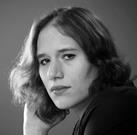 Katja Perat studied philosophy and comparative literary studies at the Faculty of Arts in Ljubljana where she is currently writing here doctoral thesis. Her first volume of poems Najboljši so padli [The Best Have Fallen] (part of which has already been translated within the framework of the TransStar project) was published 2011 and received the prize for the best debut at the Slovienian book fair and was nominated for the greatest poetry award of Slovenia, the Veronika prize. She is a literary critic and writes for Air Beletrina and Poglegi as is an executive board member of the literary journal “Idiot”. Katja Perat is one of the most ostentatious literary voices of the young generation in Slovenia. Despite her critical and cynical texts, she does believe in beauty, love and solidarity.
Katja Perat studied philosophy and comparative literary studies at the Faculty of Arts in Ljubljana where she is currently writing here doctoral thesis. Her first volume of poems Najboljši so padli [The Best Have Fallen] (part of which has already been translated within the framework of the TransStar project) was published 2011 and received the prize for the best debut at the Slovienian book fair and was nominated for the greatest poetry award of Slovenia, the Veronika prize. She is a literary critic and writes for Air Beletrina and Poglegi as is an executive board member of the literary journal “Idiot”. Katja Perat is one of the most ostentatious literary voices of the young generation in Slovenia. Despite her critical and cynical texts, she does believe in beauty, love and solidarity.
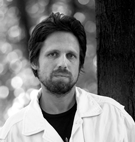 Miklavž Komelj (Kranj, 1973) is a Slovene poet, translator, literary critic and art historian. He studied History of Art at the University of Ljubljana and started publishing poetry in 1991. In 2006 he won the Jenko Award for his poetry collection Hipodrom and in 2010 the Prešeren Foundation Award for his poetry collection Nenaslovljiva imena. In 2011 he received the Rožanc Award for Nujnost poezije. He is one of the most sensible poets of the young generation. He writes for Ekran, Literatura, Likovne besede and Kino!
Miklavž Komelj (Kranj, 1973) is a Slovene poet, translator, literary critic and art historian. He studied History of Art at the University of Ljubljana and started publishing poetry in 1991. In 2006 he won the Jenko Award for his poetry collection Hipodrom and in 2010 the Prešeren Foundation Award for his poetry collection Nenaslovljiva imena. In 2011 he received the Rožanc Award for Nujnost poezije. He is one of the most sensible poets of the young generation. He writes for Ekran, Literatura, Likovne besede and Kino!
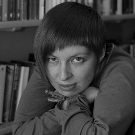 Natalka Sniadanko was born in 1973 in Lviv. She is a freelance author, translator and journalist. She translates from the German (i.a. Franz Kafka, Friedrich Dürrenmatt, Günter Grass, Stefan Zweig, Elfride Jelinek, Herta Müller, Judith Hermann) and Polish (i.a., Zbigniew Herbert, Jarosław Iwaszkiewicz, Czesław Miłosz, Janusz Wiszniewski) languages. She publishes articles in the Ukrainian and international press, e.g., Ukrainska prawda (Ukraine), Gazeta Wyborcza (Poland), Odra (Poland), Süddeutsche Zeitung, Welt (Germany), Neue Zürcher Zeitung, du (Switzerland) and New York Times. Since 2009 she is a member of the editorial staff for the Polish-German-Ukrainian literary journal RADAR. Her texts have been published in Poland, Russia, Belarus, Czech Republic, Germany, Austria, Switzerland and in the USA. She has been awarded a number of awards and scholarships, the latest being the Joseph Conrad award of the Polish Institute in Kiev in 2011 and a stipend from the Polish Ministry of Culture in Krakow. Her debut novel “Sammlung der Leidenschaften” [Collection of Passions] was published in its German translation by Anja Lutter in 2007 by dtv, Munich.
Natalka Sniadanko was born in 1973 in Lviv. She is a freelance author, translator and journalist. She translates from the German (i.a. Franz Kafka, Friedrich Dürrenmatt, Günter Grass, Stefan Zweig, Elfride Jelinek, Herta Müller, Judith Hermann) and Polish (i.a., Zbigniew Herbert, Jarosław Iwaszkiewicz, Czesław Miłosz, Janusz Wiszniewski) languages. She publishes articles in the Ukrainian and international press, e.g., Ukrainska prawda (Ukraine), Gazeta Wyborcza (Poland), Odra (Poland), Süddeutsche Zeitung, Welt (Germany), Neue Zürcher Zeitung, du (Switzerland) and New York Times. Since 2009 she is a member of the editorial staff for the Polish-German-Ukrainian literary journal RADAR. Her texts have been published in Poland, Russia, Belarus, Czech Republic, Germany, Austria, Switzerland and in the USA. She has been awarded a number of awards and scholarships, the latest being the Joseph Conrad award of the Polish Institute in Kiev in 2011 and a stipend from the Polish Ministry of Culture in Krakow. Her debut novel “Sammlung der Leidenschaften” [Collection of Passions] was published in its German translation by Anja Lutter in 2007 by dtv, Munich.
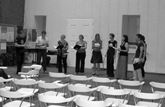 A capella Group Jazzy.si
A capella Group Jazzy.si
The vocal ensemble Jazzy.si was founded in February 2004. However, its seeds go back to the nineties, when some of its members sang in the groups Gaudeamus and Perpetuum Jazzile, with a similar repertoire and style. The music of Jazzy.si is driven by a desire to perform jazz, swing, popular, traditional and classical tunes—both international and Slovenian—and the group is kept small, so that each singer can add his or her specific vocal expression to the interpretation of a song, following the example of internationally acclaimed vocal ensembles like the Manhattan Transfer, the Swingle Singers, the Singers Unlimited, the King Singers, and others. Therefore, the ensemble’s repertoire contains a wide variety of arrangements, ranging from Bach fugues through Beatles songs to Irish folk music and beyond. And, of course, Jazzy.si also draws from the rich heritage of Slovenian poets and composers such as Mojmir Sepe, Elza Budau, Gregor Strniša and many more. Jazzy.si focuses on Ljubljana and its neighbourhood, providing vocal entertainment for cultural and social events. In June 2006, Jazzy.si first became actively engaged in the European vocal scene attending the Europa Cantat International Choral Music Festival in Mainz (Germany).
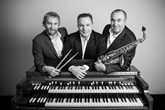 Jazz Gruppe Lothar Krist B3
Jazz Gruppe Lothar Krist B3
B3 – For connoisseurs this is the abbreviation for the legendary Hammond organ, which lent its authentic sound initially to American gospel songs and soon after to blues, soul and jazzbands. Lively swing and groove, personal expression, and honest, handmade music: this is the credo of this trio with Lothar Krist on saxophone, René Rooimans on Hammond B3, and Timo Warnecke on drums. Lothar Krist, director and lead saxophone player of the Hannover Big Band, was fortunate to find in René Rooimans an organist whose footbass skills makes many a bass player go green with envy. René’s rich chords and many layered sound lend the power of a whole big band to the trio. Drummer Timo Warnecke has a Master’s degree of the University of Music in Hannover. He is the turbocharger of the Hannover Big Band and pulls all stops of his ability with the B3 trio. The repertoire of Lothar Krist’s B3 is set in the tradition of Jimmy Smith, the “Master of the Hammond Organ”, and features jazz hits from five decades as well as original compositions from sweet to hot all packaged in fresh, contemporary arrangements.
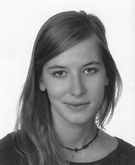 Irena Smodiš was born in 1990 in Ljubljana. She grew up in Ljubljana but spent some years in Vienna and Berlin. At the moment she is writing her master thesis at the Department of German, Dutch and Swedish at the Faculty of Humanities of the University of Ljubljana. She translates from German to Slovene. Other languages: English, Croatian, Spanish, Swedish. She works as a German teacher and works at the editorial Beletrina. In the TransStar project she translated texts from Eugen Ruge and PeterLicht.
Irena Smodiš was born in 1990 in Ljubljana. She grew up in Ljubljana but spent some years in Vienna and Berlin. At the moment she is writing her master thesis at the Department of German, Dutch and Swedish at the Faculty of Humanities of the University of Ljubljana. She translates from German to Slovene. Other languages: English, Croatian, Spanish, Swedish. She works as a German teacher and works at the editorial Beletrina. In the TransStar project she translated texts from Eugen Ruge and PeterLicht.
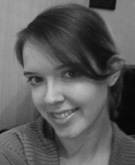 Alenka Lavrin
Alenka Lavrin
Since 2011 Alenka Lavrin is a Master’s student of Translation Studies at the Faculty of Humanities at the University of Ljubljana. As a student she participated in various student organisations and projects, e.g., as a member of Student Council and a coordinator of student tutors at the faculty. In 2012 she also worked as the head of translators at the International Student Film and Video Festival – Filofest. She is very glad to be able to participate in the TransStar Europaproject since in her opinion this project represents a good opportunity for translators to launch their career.
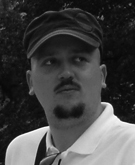 Janko Trupej
Janko Trupej
After graduating in Translation and Interpreting (English and German) at the University of Maribor (2004–2009), he enrolled in the Translation Studies Ph.D programme at the University of Ljubljana under the supervision of Prof. Dr. Nike Kocijančič Pokorn – completion is expected in autumn of 2013. He presented papers at the University of East Anglia und the University of Ljubljana, participated in seminars organised by Katholieke Universiteit Leuven, Karl-Franzens-Universität Graz, Alpen-Adria-Universität Klagenfurt, and contributed to the publication Translation and the Reconfiguration of Power Relations: Revisiting the Role and Context of Translation and Interpreting (LIT Verlag, 2012). He works as a freelance translator and taught a course in Business English for the Centre for Life-Long Education of the Faculty of Arts in Maribor (2010–2011).
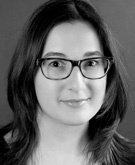 Karmen Schödel
Karmen Schödel
Karmen Schödel was born in Reutlingen in 1976. In 1980 she moved to Slovenia, grew up in Rogaka Slatina. After studying Economics in Maribor, she worked in the field of auditing and consultancy, initially in Ljubljana and from 2001 on in Nuremberg. Her activity as a translator began during this period. In 2005 she passed the state examination as a translator for the Slovenian language in Darmstadt. She is a publicly appointed and certified translator for the Slovenian language at the Nuremberg-Fürth Regional Court. Since 2006 she is a freelance translator for German and Slovenian, specializing in: law, business, technology, tourism and the arts. She is a member of the German Federal Association of Interpreters and Translators (BDÜ) and has experience in the translation of literary texts during the staging of Peter Handke’s Immer noch Sturm (Still Storm) directed by Stefan Otteni at Staatstheater Nürnberg (Nuremberg State Theatre), April 2012.
Ana Dejanovič received a BA degree in Translation from the Department of Translation at the Faculty of Humanities of the University of Ljubljana in 2012. Since October 2012 she has been a student of Interpreting (MA) at the Department of Translation in Ljubljana. She translates from German to Slovene.
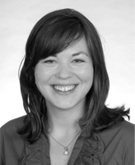 Franziska Mazi studied Slavonic Philology and English at the University of Basel (Switzerland) with her main focus on South-Slavonic Studies. Exchange semesters were spent in St. Petersburg and Split. Since 2012, she has been writing articles for a cultural journal in Basel and working on small translation projects into German and English. Since April 2013 she has been a member of the TransStar translation group, led by Daniela Kocmut, translating from Slovenian into German. Her current translation project is the novel by Goran Vojnović What Did You Do in the Yugoslav Wars, Daddy?, 2012.
Franziska Mazi studied Slavonic Philology and English at the University of Basel (Switzerland) with her main focus on South-Slavonic Studies. Exchange semesters were spent in St. Petersburg and Split. Since 2012, she has been writing articles for a cultural journal in Basel and working on small translation projects into German and English. Since April 2013 she has been a member of the TransStar translation group, led by Daniela Kocmut, translating from Slovenian into German. Her current translation project is the novel by Goran Vojnović What Did You Do in the Yugoslav Wars, Daddy?, 2012.
 Lydia Nagel studied Slavonic Languages and Cultural Science in Berlin, Belgrade and Moscow. From 2008 to 2010 she managed an intern programme for Ukrainian and Belorussian students in the state of Brandenburg. Currently, she teaches at the Department of Slavonic Studies of the University of Vienna. She lives in Berlin and Vienna and translates from various Slavonic languages into German, mainly contemporary prose and drama. She is a member of the project management team of Drama Panorama, an open forum for German and international translators of dramatic literature
Lydia Nagel studied Slavonic Languages and Cultural Science in Berlin, Belgrade and Moscow. From 2008 to 2010 she managed an intern programme for Ukrainian and Belorussian students in the state of Brandenburg. Currently, she teaches at the Department of Slavonic Studies of the University of Vienna. She lives in Berlin and Vienna and translates from various Slavonic languages into German, mainly contemporary prose and drama. She is a member of the project management team of Drama Panorama, an open forum for German and international translators of dramatic literature
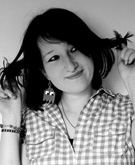 Anja Wutej was raised bilingual (Slovenian, German). She studied in the Department of Translation of the Faculty of Humanities at University of Ljubljana and continued her studies at the Faculty of Criminal Justice and Security in Maribor. During her studies she was awarded different scholarships (Erasmus, DAAD, the national Zois scholarship for talented students) and spent one semester in Lisbon and one month in Berlin. She participated in various projects (translations for HALMA, Poetikon and for UNIKUM, the cultural center of the university in Klagenfurt). In her free time she enjoys acting, filmmaking, singing and handicrafts.
Anja Wutej was raised bilingual (Slovenian, German). She studied in the Department of Translation of the Faculty of Humanities at University of Ljubljana and continued her studies at the Faculty of Criminal Justice and Security in Maribor. During her studies she was awarded different scholarships (Erasmus, DAAD, the national Zois scholarship for talented students) and spent one semester in Lisbon and one month in Berlin. She participated in various projects (translations for HALMA, Poetikon and for UNIKUM, the cultural center of the university in Klagenfurt). In her free time she enjoys acting, filmmaking, singing and handicrafts.
Daniela Trieb
Daniela Trieb completed her undergraduate studies (BA) of Slavic and German Philology at the University of Tübingen. Her postgraduate Studies (MA) of Slovene philology the completed at the University of Graz. Her exchange semester she spent in Ljubljana and has participated in workshops for literary translation.
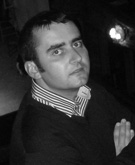 Mykola Lipisivitskij was born in Katerynivka, Zhytomyr region in Ukraine. After studying German Language and Literature and his post graduate defense [2012] on German short play of the 20th century, he has been the head of the Centre of Brecht Studies and worked as an associate professor at the Zhytomyr State University after Ivan Franko. He has translated Bertolt Brecht’s Die Dreigroschenoper (2010), an extract from K. Lange-Müller’s novel Die verfrühte Tierliebe (2011) and four plays by L. Hübner, Ph. Löhle, F. Richter und I. Lausund within the framework of the research project for Goethe Institute „SCHAG“ into Ukrainian.
Mykola Lipisivitskij was born in Katerynivka, Zhytomyr region in Ukraine. After studying German Language and Literature and his post graduate defense [2012] on German short play of the 20th century, he has been the head of the Centre of Brecht Studies and worked as an associate professor at the Zhytomyr State University after Ivan Franko. He has translated Bertolt Brecht’s Die Dreigroschenoper (2010), an extract from K. Lange-Müller’s novel Die verfrühte Tierliebe (2011) and four plays by L. Hübner, Ph. Löhle, F. Richter und I. Lausund within the framework of the research project for Goethe Institute „SCHAG“ into Ukrainian.
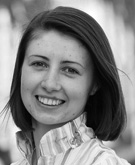 Olha Kravchuk
Olha Kravchuk
Olha Kravchuk studied German-Ukrainian Translation at the National Jurij-Fedkovych-University in Chernivtsi. Since 2010 she has been working at the Zentrum Gedankendach where she is a mentor to literature and film projects. Currently she is also a PhD student at the Department of Foreign Literature History and Literature Theory at the University of Chernivtsi doing research on the work of Rose Ausländer. She is also a Vladimir-Admoni-Fellow (DAAD) within a GIP partnership between the Institute of German and Dutch Literature at the FU Berlin and the Centre for German Studies at the Taras Shevchenko Institute for Literature at the Ukrainian Academy of Science.
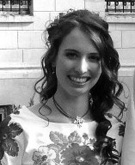 Yuliya Mykytyuk completed German Studies at the National Ivan Franko University of Lviv (2004-2009), at FAU Erlangen-Nurnberg (2007) and at the University Duisburg-Essen (2007-2008) (within the framework of DAAD scholarships for Germanists). Between 2009 and 2010 she was a high school teacher at the Department of German Philology at the National Ivan Franko University of Lviv. Since November 2010 she is a PhD student at the Department of German Philology at the National Ivan Franko University of Lviv, working on her dissertation entitled “Compliment as a Two-Part Speech Act in German Dramas of the 18th-21st Centuries”. Between August and September 2011 she conducted research work at the FAU Erlangen-Nurnberg (DAAD scholarship for PhD students). Since September 2009 she is a teacher at the Language Learning Center Lviv, partner of the Goethe Institute Kyiv. Since 2007 she is involved as an interpreter (in the social programs of the Red Cross, to scientific conferences, in the “Galician school of hospitality” to EURO 2012). Since 2008 she translates from German into Ukrainian (the works of P. Bichsel, F. Kafka, I. Parei, P. Scheuermann).
Yuliya Mykytyuk completed German Studies at the National Ivan Franko University of Lviv (2004-2009), at FAU Erlangen-Nurnberg (2007) and at the University Duisburg-Essen (2007-2008) (within the framework of DAAD scholarships for Germanists). Between 2009 and 2010 she was a high school teacher at the Department of German Philology at the National Ivan Franko University of Lviv. Since November 2010 she is a PhD student at the Department of German Philology at the National Ivan Franko University of Lviv, working on her dissertation entitled “Compliment as a Two-Part Speech Act in German Dramas of the 18th-21st Centuries”. Between August and September 2011 she conducted research work at the FAU Erlangen-Nurnberg (DAAD scholarship for PhD students). Since September 2009 she is a teacher at the Language Learning Center Lviv, partner of the Goethe Institute Kyiv. Since 2007 she is involved as an interpreter (in the social programs of the Red Cross, to scientific conferences, in the “Galician school of hospitality” to EURO 2012). Since 2008 she translates from German into Ukrainian (the works of P. Bichsel, F. Kafka, I. Parei, P. Scheuermann).
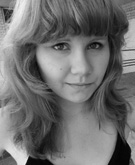 Valentyna Bilokrynytska
Valentyna Bilokrynytska
Born 1994 in Cherkasy, Valentyna Bilokrynytska studied Political Science at the Kyiv-Mohyla Academy. She interviewed victims of the deportation of the Germans within the Soviet Union and the witnesses to the Second World War. In 2012 she left the academy to study Translation at the Taras Shevchenko University of Kyiv.
Olga-Daryna Drachuk was born in Vinnyzia in 1989. She studied German Studies at the National Ivan Franko University in Lviv. In 2011 she defended her MA thesis on the issues in the plays of Elfriede Jelinek. She is a fellow of the DAAD and OEAD foundations. She lives in Vinnyzia and Lviv and works as a freelance translator, poet, social worker, actor in an amateur ensemble, globetrotter.
STUTTGART, September 2014
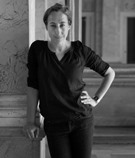 Judith Hermann
Judith Hermann
Foto © Andreas Labes
Aller Liebe Anfang [The Beginning of all Love] is Judith Hermann’s first novel. Stella and Jason are married, they have one daughter, Ava, and live in a house at the edge of the city. One day a man, a stranger, appears at their door in order to have a talk with Stella, as he claims. The next day the stranger comes again and after that does not leave her alone anymore. Judith Hermann tells the story of a life believed to be safe and sound that suddenly falls apart and of the irrational feeling of being defenseless. She is considered to be a definitive and formative German-language narrator of the Berlin of the 1990s. She is widely reviewed and translated, especially in the countries of Central and Eastern Europe. In the second part of the evening Judith Hermann will survey the European dimension of her texts together with her translator Yurko Prokhasko, who at the same time is one of the leading intellectuals of Ukraine.
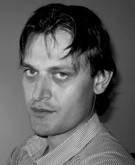 Jurko Prochasko
Jurko Prochasko
Foto © Markijan Prochasko
Was born in the eastern Galician Ivano-Frankivsk and is a specialist in German Studies, translator, essayist, journalist (Krytyka, Ji, Tygodnik Powszechny, Die Zeit, Kafka, La Repubblika, Falter, Frankfurter Rundschau, Volltext, Süddeutsche Zeitung) and curator of exhibitions. He studied German Studies (1987 – 1992) and Psychology (2004 – 2009) at the University of Lviv and completed the training as group analyst in Altaussee (Austria, 1997 – 2007). Translates from German (i.a. R. Musil, J. Roth, F. Kafka, R.M. Rilke, J. Hermann), Polish (J. Wittlin, J. Iwaszkiewicz, L. Kołakowski) and Jiddish (Deborah Vogel). Corresponding member of the Saxon Academy of Arts (Dresden, since June 2007). He ist he Friedrich Gundolf prize winner for mediating German culture abroad awarded by the German Academy for Language and Poetry (Darmstadt, 2008). In 2008 he received Translatio, the Autrian national prize for literary translation. In the academic year 2011-12 he was a fellow at the Wissenschaftskolleg zu Berlin [Institute for Advanced Study] and in 2013 he was a fellow at the Landis&Gyr Foundation (Zug, Switzerland). He is a member of the editorial staff of the Kiev monthly Krytyka.
Yurko Prokhasko lives in Lviv where he works at the Ivan Franko Institute of the Ukrainian Academy of Sciences as well as at the Ivan Franko University and at the Psychoanalytical Institute (2010) of which he is one of the founders.
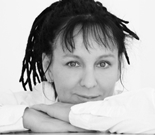 Olga Tokarczuk
Olga Tokarczuk
Foto © Grzegorz Zygadlo Schöffling & Co
Olga Tokarczuk has received numerous awards for her writing and is considered to be one of the big names in Polish literature. With the novel The Song of Bats she ventures into the genre of thrillers, a genre that is new for her. The quirky narrator Janina Duszejko, the village English teacher, has two passions: astrology and animals. When one dead body after another is found in the neighborhood, she is always one step ahead of the police. In the process she knows how to skillfully use the inconspicuous appearance of an older woman with plastic bag in hand. Tokarczuk was born in 1962 and in 2008 she was awarded the most important Polish literary award, the Nike prize. The film adaption of The Song of Bats is planned as a German-Polish coproduction with Agnieszka Holland as director.
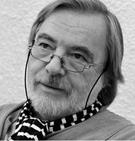 Frank Günther
Frank Günther
Foto © Frank Günther
With the help of words, photos, installations and film this event will search for the art of literary translation. In a word performance the translator and Shakespeare expert Frank Günther will provide fascinating insights into Shakespeare’s world, whose 450th birthday will be celebrated this year. In an unconventional and lively manner he invites the audience to join him on a unique walk through Shakespeare’s works. Günther, who was born in 1947, has translated Shakespeare for over 40 years now.
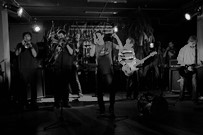 Serhij Zhadan (Foto © Getman) & “Sobaky v kosmosi” [dt. Hunde im Weltall]
Serhij Zhadan (Foto © Getman) & “Sobaky v kosmosi” [dt. Hunde im Weltall]
The „boldest voice of the younger generation of the Ukrainian literary scene“ (Neue Zürcher Zeitung), Serhiy Zhadan and the ska band Sobaky v kosmosi combine ska and reggae of political emigrants from Jamaica with psychedelic choir elements from Ukrainian folk music. During their concert in Stuttgart, the musicians will introduce their new album Fight for Them.
Serhiy Zhadan, who was born in 1974, is the most important and most exciting representative of a younger generation of writers in Ukraine today. He comes from Eastern Ukraine which is characterised by heavy metal and mining metropolises and whose population was greatly influenced by the industrial myth of the Soviet period. In his works of prose called Depeche Mode, Anarchy in the UKR and Hymn of a Democratic Youth he tracks down this space and its people. He accompanies whores, mine workers, students, the down-and-out and many others on their search for a new identity in the confusion of the new times.
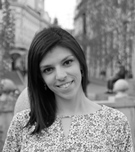 Tina Štrancar
Tina Štrancar
Foto © Andrej Lovšin
Tina Štrancar was born in Ljubljana, Slovenia in 1985. She studied German language and literature at the Faculty of Arts, University of Ljubljana, after which she continued her studies at the doctoral level in literary studies in Ljubljana and Berlin (doctoral thesis: The Discourse of Memory in Contemporary German Family Narratives). She has received a number of grants for her scholarly and translation work (DAAD, Robert Bosch Stiftung, Meeting of translators at the Literarisches Colloquium Berlin, etc.). Since 2008 she has been translating fiction, poetry, and children’s literature from German into Slovenian (including Bleutge, Bodrožič, Camenisch, Dinev, Erpenbeck, Hacker, Hermann, Kehlmann, Ransmayr, Schwitter and Stavarič) and is a member of the Slovenian Association of Literary Translators (DSKP). She spends her time between Berlin and Ljubljana.
In the relaxed atmosphere of a private residence in Stuttgart, participants of the EU-funded project TransStar Europe will present excerpts from their literary translations of texts by great authors from the countries they come from. They will read texts of contemporary authors who tell their story in present day Europe. It is a story of identity and homelessness, uprootedness, foreigners and foreign lands, new beginnings and of borders, of the movement of borders and their transgression.
KRAKOW, Januar 2014
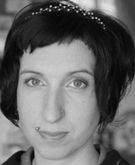 Sylwia Chutnik (born 1979) studied Cultural and Gender Studies in Warsaw and has worked as a writer and journalist. She has published several novels, i.a. „Kieszonkowy Atlas Kobiet“ (2008), German „Weibskram“ (2011), „Dzidzia“ (2009), „Cwaniary“ (2012) and in addition she has also published essays, i.a. the collection „Mama zawsze ma rację“ [Mother is Always Right]. She regularly writes columns in the journals „Polityka“ and „Pani“ and also in the collection of short stories „Prosze wejść“. She also writes plays. In 2008 Chutnik’s novel „Weibskram“ was awarded the Paszport Polityki prize. In 2009 she received the Ashoka Online Nobel prize for her social engagement for mothers’ rights in Poland.
Sylwia Chutnik (born 1979) studied Cultural and Gender Studies in Warsaw and has worked as a writer and journalist. She has published several novels, i.a. „Kieszonkowy Atlas Kobiet“ (2008), German „Weibskram“ (2011), „Dzidzia“ (2009), „Cwaniary“ (2012) and in addition she has also published essays, i.a. the collection „Mama zawsze ma rację“ [Mother is Always Right]. She regularly writes columns in the journals „Polityka“ and „Pani“ and also in the collection of short stories „Prosze wejść“. She also writes plays. In 2008 Chutnik’s novel „Weibskram“ was awarded the Paszport Polityki prize. In 2009 she received the Ashoka Online Nobel prize for her social engagement for mothers’ rights in Poland.
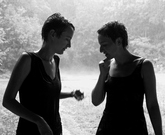 Foto: Ulrike Almut Sandig und Marlen Pelny
Foto: Ulrike Almut Sandig und Marlen Pelny
Foto © Manuela Kasemir
Marlen Pelny (born 1981) works in Berlin and Leipzig as a freelance musician and poet. In 2004 her songpoetryduo called sonntags published its debut of the same name and in 2005 the CD entitled zwischen eigenen Worten [between own words]. Six years ago she founded the literature group named augenpost which placarded her poems in the streets of different German cities. In 2007 augenpost distributed poems to people via postcards. Marlen Pelny performs together with Ulrike Almut Sandig at a reading concert and published the audio book der tag, an dem alma kamillen kaufte [the day alma bought chamomiles]. Recently her poetry film Wanduhr [wall clock] was released and in summer of 2007 her first book of poetry called Auftakt [prelude] as well as the CD titled dein name im schallloch [your name in the sound hole].
Ulrike Almut Sandig (born 1979) studied Religious Studies and Indology as well as at the German Institute for Literature in Leipzig. She is a poet and a prose writer. To date her collection of poems entitled Zunder (2005), Streumen (2007) and Dickicht (2011) were published, the audio book der tag, an dem alma kamillen kaufte (2006, in cooperation with Marlen Pelny) the radio plays entitled Hush little Baby (2008) and Unter Wasser (2010) as well as her first prose publication called Flamingos (2010). Her poems were recognized for their excellence numerous times of which the latest was the Leonce and Lena Prize in 2009. For FLAMINGOS she received the Silver Pig Prize of lit.COLOGNE (2010), the Hotlist Prize of Independent Publishers (2010) and the Märkisch Fellowship for Literature in 2012. Latest Ulrike Almut Sandig was awarded the Droste Advancement Scholarship of the City of Meersburg. She lives in Berlin.
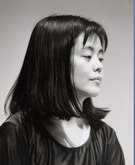 Yoko Tawada
Yoko Tawada
Foto © Dagmar Gebers
Yoko Tawada was born in Tokyo in 1960 and since 1982 she has been living in Germany, first in Hamburg and since 2007 in Berlin. She completed her Literature Studies in Tokyo and Hamburg with a PhD. Her first literary publications were in 1986 in “Japanese Reader”. The first book publication in Germany was in 1987 (Nur da wo du bist da ist nichts [Only there where you are there is nothing]), in Japan in 1992 (Sanninkankai). She writes in German and Japanese. Up until 2013 22 books have been published in German.
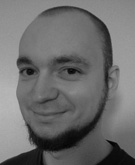 Lukas Laski
Lukas Laski
Born in 1984 in Poland he lives in Germany. He graduated in Slavic Studies, with the main focus on Polish Literary Studies and Philosophy at the University of Bochum. Growing up between and with two languages, an awareness of language has left its mark on him, which made him receptive for similarities in and differences between his two mother tongues. The questions how something is called in the other language and in how far the two terms are congruent became more and more important. Besides private renditions he also translated some scientific articles and several texts into German and Polish for a literary workshop guided by the translator Bernhard Hartmann and the Polish author Lidia Amejko. Furthermore he functioned as a mediator during his work for the Polish Institute Düsseldorf, for Pax Christi Aachen and as an interpreter for Polish students in Germany.
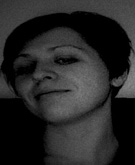 Zofia Sucharska
Zofia Sucharska
Until 2012 Zofia Sucharska studied German philology in Gdańsk, Poland. The topics she focused on was translation and literature. Almost one year ago she moved to Berlin and is studying New German Literature at Free University of Berlin. The project TransStar is a perfect opportunity to gain valuable experience in translation, exchange this experience with other people, while being guided by professionals.
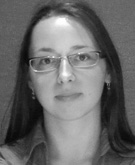 Karolina Matuszewska
Karolina Matuszewska
Karolina Matuszewska (born 1988) is doctoral candidate at the chair of Austrian and Swiss Literature and Culture (University of Szczecin) and a student in Roman Philology. Her main area of interest is German literature, primarily the works of Paul Scheerbart and Urs Widmer. She has participated in German-Polish oral history projects and in translation competitions.
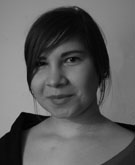 Magdalena Stefańska
Magdalena Stefańska
Magdalena Stefańska was born in Lodz in 1990 and graduated from the secondary school No. 8 in Lodz, a partner school of Germany. She received a DAAD scholarship, was an intern at the Germany-Poland Institute in Darmstadt and the Union of European Federalists in Lodz. She participated in a number of international projects and was an exchange student at the Johannes Gutenberg University in Mainz and the Otto Friedrich University in Bamberg. Currently she is a student of interdisziplinary individual humanstic studies at the University of Lodz with a focus on philosophy and German studies.
 Magda Włostowska
Magda Włostowska
From 2004 to 2012 Magda Włostowska studied Political Science, East and Southeast European Studies and Polish Studies at the University of Leipzig. During her studies she gained work experience at different internships and activities, i.a. at the Heinrich Böll Foundation Warsaw and at the research group “Pathways of Law” at the Institute for Slavic Studies of the University of Leipzig. Since 2012 she works at the Centre for the History and Culture of East Central Europe (Geisteswissenschaftliches Zentrum Geschichte und Kultur Ostmitteleuropas – GWZO) at the University of Leipzig and in addition to her dedication to (queer)feminist projects she currently also works on formulating a dissertation proposal. Since 2010 she is a certified translator for Polish. Within the framework of the TransStar project she will translate from the novel Dzidzia by Sylwia Chutnik.
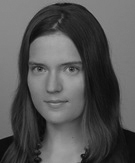 Magdalena Lewandowska was born in Poznań, Poland in 1989. Since 2008 she studied Applied Linguistics at Adam Mickiewicz University in Poznań. In 2011 she finished her BA studies and in September 2013 she will graduate with a master’s degree. The academic year 2011/2013 was spent in Germany at Johannes Gutenberg University Mainz as a part of an Erasmus program. Since May 2013 she works at McKinsey EMEA Shared Services in Poznań as a visual graphic specialist. In her free time she enjoys riding bike — both road cycling and bicycle touring. My biggest passion is classic rock of 60’s and 70’s.
Magdalena Lewandowska was born in Poznań, Poland in 1989. Since 2008 she studied Applied Linguistics at Adam Mickiewicz University in Poznań. In 2011 she finished her BA studies and in September 2013 she will graduate with a master’s degree. The academic year 2011/2013 was spent in Germany at Johannes Gutenberg University Mainz as a part of an Erasmus program. Since May 2013 she works at McKinsey EMEA Shared Services in Poznań as a visual graphic specialist. In her free time she enjoys riding bike — both road cycling and bicycle touring. My biggest passion is classic rock of 60’s and 70’s.
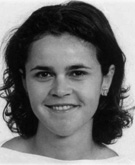 Ines Hudobec was born in Frankfurt am Main (Germany) in 1977, and moved to Croatia in 1983. She studied Economics in Zagreb, European Economics (MBA-Europe) at the Europa-Institut in Saarbrücken (Germany) and Conference Interpreting (A-language Croatian; B-Language German) in Zagreb. Thanks to a DAAD scholarship she studied in Germany. Since 2003, she has been working as freelance translator, interpreter and professional tourist guide in Croatia. She has also been studying German Language and Literature/Cultural Studies, and Ethnology and Cultural Anthropology at the Faculty of Philosophy of the University in Zagreb since October 2012.
Ines Hudobec was born in Frankfurt am Main (Germany) in 1977, and moved to Croatia in 1983. She studied Economics in Zagreb, European Economics (MBA-Europe) at the Europa-Institut in Saarbrücken (Germany) and Conference Interpreting (A-language Croatian; B-Language German) in Zagreb. Thanks to a DAAD scholarship she studied in Germany. Since 2003, she has been working as freelance translator, interpreter and professional tourist guide in Croatia. She has also been studying German Language and Literature/Cultural Studies, and Ethnology and Cultural Anthropology at the Faculty of Philosophy of the University in Zagreb since October 2012.
 Olha Kravchuk studied German-Ukrainian Translation at the National Jurij-Fedkovych-University in Chernivtsi. Since 2010 she has been working at the Zentrum Gedankendach where she is a mentor to literature and film projects. Currently she is also a PhD student at the Department of Foreign Literature History and Literature Theory at the University of Chernivtsi doing research on the work of Rose Ausländer. She is also a Vladimir-Admoni-Fellow (DAAD) within a GIP partnership between the Institute of German and Dutch Literature at the FU Berlin and the Centre for German Studies at the Taras Shevchenko Institute for Literature at the Ukrainian Academy of Science.
Olha Kravchuk studied German-Ukrainian Translation at the National Jurij-Fedkovych-University in Chernivtsi. Since 2010 she has been working at the Zentrum Gedankendach where she is a mentor to literature and film projects. Currently she is also a PhD student at the Department of Foreign Literature History and Literature Theory at the University of Chernivtsi doing research on the work of Rose Ausländer. She is also a Vladimir-Admoni-Fellow (DAAD) within a GIP partnership between the Institute of German and Dutch Literature at the FU Berlin and the Centre for German Studies at the Taras Shevchenko Institute for Literature at the Ukrainian Academy of Science.
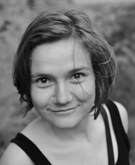 Anna Koubová
Anna Koubová
Anna Koubová was born 1990 in Prague and studied Czech Language and Literature, Translation and Linguistics in Prague and Paris. For several years already she has worked as an interpreter and German and Czech teacher. Currently her first steps in the translation adventure are being made. She has been involved as a volunteer in German-Czech Youth Forum and Literature Magazine “Plav” and is keen on communication between people and cultures, on languages, literature and nature of any sort.
 Martin Mutschler
Martin Mutschler
Foto © Tobias Bader
Martin Mutschler, born in Stuttgart in 1986, studied Romance Philology, Slavic Philology and Art History in Tübingen and Prag and is currently working at the theatre. He writes on culture and translates from different languages. In the winter of 2011/12 he was an intern at the European Capital of Culture 2015 in Pilsen, since then he is a committee member of the GFPS-CZ association. Anything else? Everything about culture, within culture, for us. Music is important, maybe the passion for poetry or the world of Bohumil Hrabals’ language derives from music.
 Maja Konstantinović
Maja Konstantinović
Maja Konstantinović was born in Vukovar in 1989, a few years later in 1993 she and her family flee to Bruchköbel, Hesse. After a successful B.A. in Slavic Studies and Political Science in Tübingen, she is now enrolled in a graduate program for literary and culture theory. In 2008 she participated in “Translators in Residence”, a project of the Slavic Studies Department of the University of Tübingen. Her first professional experience in 2009 was translating the subtitles to Tena Štivičić’s play “Seven Days in Zagreb”, which was performed as part of the theater project “Orient Express” at the Staatstheater Stuttgart. She currently organizes a panel discussion on the cross-cultural issues concerning the verbalization of culture as a process of translation.
 Karmen Schödel
Karmen Schödel
Karmen Schödel was born in Reutlingen in 1976. In 1980 she moved to Slovenia, grew up in Rogaka Slatina. After studying Economics in Maribor, she worked in the field of auditing and consultancy, initially in Ljubljana and from 2001 on in Nuremberg. Her activity as a translator began during this period. In 2005 she passed the state examination as a translator for the Slovenian language in Darmstadt. She is a publicly appointed and certified translator for the Slovenian language at the Nuremberg-Fürth Regional Court. Since 2006 she is a freelance translator for German and Slovenian, specializing in: law, business, technology, tourism and the arts. She is a member of the German Federal Association of Interpreters and Translators (BDÜ) and has experience in the translation of literary texts during the staging of Peter Handke’s Immer noch Sturm (Still Storm) directed by Stefan Otteni at Staatstheater Nürnberg (Nuremberg State Theatre), April 2012.
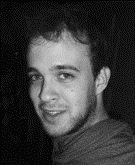
Stefan Heck
Stefan Heck was born in São Paulo, Brazil, in 1987and moved to Germany in 1990. He studied Slavic Philology and Business Administration in Tübingen and Warsaw. During a summer school stay in 2009 he fell deeply in love with Ukrainian. After his master’s degree in 2012 he started working as an assistant in the Department of Slavic Studies at the University of Tübingen and began a PhD on the Slavic aspect in 2013.
 Mykola Lipisivitskij
Mykola Lipisivitskij
Mykola Lipisivitskij was born in Katerynivka, Zhytomyr region in Ukraine. After studying German Language and Literature and his post graduate defense [2012] on German short play of the 20th century, he has been the head of the Centre of Brecht Studies and worked as an associate professor at the Zhytomyr State University after Ivan Franko. He has translated Bertolt Brecht’s Die Dreigroschenoper (2010), an extract from K. Lange-Müller’s novel Die verfrühte Tierliebe (2011) and four plays by L. Hübner, Ph. Löhle, F. Richter und I. Lausund within the framework of the research project for Goethe Institute „SCHAG“ into Ukrainian.
Jakob Walosczyk
Jakob Walosczyk, born in 1981, translates from Polish and Russian. While he grew up in Silesia and Swabia and it at home in Franconia now, he merely speaks standard German. He holds a degree in Slavonic and English Studies and has been working as an instructor of German as a foreign language since 2010. Lives in Bamberg.
Daniela Trieb
Daniela Trieb completed her undergraduate studies (BA) of Slavic and German Philology at the University of Tübingen. Her postgraduate Studies (MA) of Slovene philology the completed at the University of Graz. Her exchange semester she spent in Ljubljana and has participated in workshops for literary translation.
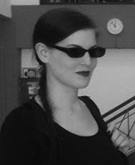 Ana Dejanovič
Ana Dejanovič
Ana Dejanovič received a BA degree in Translation from the Department of Translation at the Faculty of Humanities of the University of Ljubljana in 2012. Since October 2012 she has been a student of Interpreting (MA) at the Department of Translation in Ljubljana. She translates from German to Slovene.
Relying on the structure and methodology of classical and postclassical [...]
For further information on translation, the TransStar project and the [...]
Relying on the structure and methodology of classical and postclassical [...]
Sir or Madam, In co-operation with KulturKontakt Austria, the Austrian [...]
Five short films with translations (videopoetry) were made as part [...]
Translating Cube: Six Sides of European Literature and Translation Berlin, [...]
Programme (PDF)
Five short films with translations (videopoetry) were made as part [...]
Translating Cube: Six Sides of European Literature and Translation Berlin, [...]
Programme (PDF)
Translating Cube in Tübingen Reinold Hermanns: SWR2 Journal am Mittag, [...]
Being Exchanged: Between Paris, Stuttgart and Ivano-Frankivsk Yuri Andrukhovytsh, Lubomír [...]
Five short films with translations (videopoetry) were made as part [...]
Bookstore: http://www.edition-fototapeta.eu/geschichten-erzaehlen
More here (PDF). Bookstore: https://knjigarna.ff.uni-lj.si/si/izdelek/1623/pet-poti-do-prevoda/
Five short films with translations (videopoetry) were made as part [...]
Bookstore: http://www.edition-fototapeta.eu/geschichten-erzaehlen
More here (PDF). Bookstore: https://knjigarna.ff.uni-lj.si/si/izdelek/1623/pet-poti-do-prevoda/
Translating Cube: Six Sides of European Literature and Translation Berlin, [...]
Programme (PDF)

